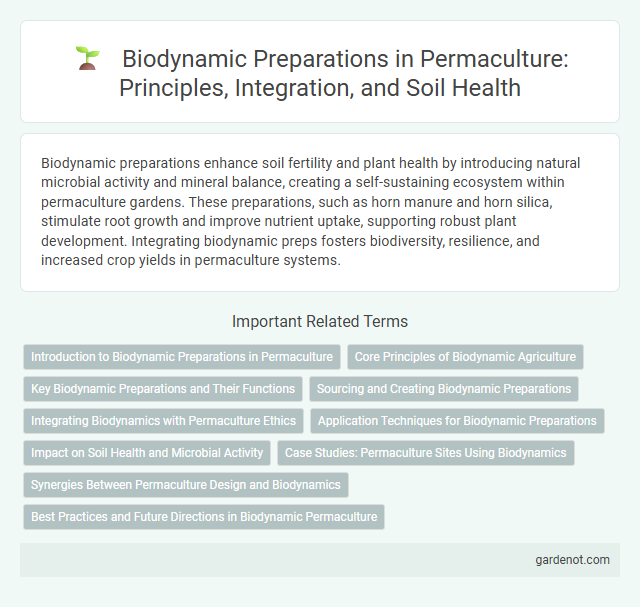Biodynamic preparations enhance soil fertility and plant health by introducing natural microbial activity and mineral balance, creating a self-sustaining ecosystem within permaculture gardens. These preparations, such as horn manure and horn silica, stimulate root growth and improve nutrient uptake, supporting robust plant development. Integrating biodynamic preps fosters biodiversity, resilience, and increased crop yields in permaculture systems.
Introduction to Biodynamic Preparations in Permaculture
Biodynamic preparations are specialized natural formulations used in permaculture to enhance soil health and plant vitality by harnessing cosmic and terrestrial energies. These preparations, including horn manure (Preparation 500) and horn silica (Preparation 501), are applied in minute quantities to stimulate microbial activity and improve nutrient cycling within the ecosystem. Integrating biodynamic preparations into permaculture practices supports holistic farm biodiversity and promotes sustainable, regenerative agriculture.
Core Principles of Biodynamic Agriculture
Biodynamic preparations are essential in permaculture, enhancing soil fertility and plant health through natural materials like compost, herbs, and minerals. Core principles of biodynamic agriculture emphasize holistic farm management, integrating plants, animals, and soil into a self-sustaining ecosystem. These preparations stimulate microbial activity and foster nutrient cycling, promoting resilient and productive agricultural systems.
Key Biodynamic Preparations and Their Functions
Key biodynamic preparations include horn manure (Preparation 500) for soil enrichment, enhancing microbial life and nutrient availability. Preparation 501, horn silica, stimulates photosynthesis and strengthens plant growth by improving light absorption. Compost preparations 502 to 507 promote humification, balance soil biology, and regulate decomposition, supporting overall soil fertility and plant health.
Sourcing and Creating Biodynamic Preparations
Biodynamic preparations are crafted using specific natural materials such as cow manure, quartz silica, and medicinal herbs including yarrow, chamomile, and dandelion, sourced from local organic environments to maintain ecological integrity. The creation process involves precise fermentation and composting techniques following Rudolf Steiner's guidelines, enhancing soil vitality and plant health by stimulating microbial activity. Proper sourcing and meticulous preparation ensure that these inputs integrate seamlessly into permaculture systems, promoting sustainable nutrient cycling and ecosystem resilience.
Integrating Biodynamics with Permaculture Ethics
Biodynamic preparations enhance soil health and plant vitality by stimulating microbial activity and nutrient cycling, aligning closely with permaculture principles of care for Earth and people. Integrating biodynamics within permaculture ethics encourages holistic, regenerative farming practices that balance ecological systems while promoting biodiversity. This synergy supports sustainable food production by fostering resilient ecosystems and ethical stewardship of natural resources.
Application Techniques for Biodynamic Preparations
Biodynamic preparations are applied using specific techniques that enhance soil vitality and plant health, such as stirring the preparations in water to create a vortex before spraying. These methods maximize the distribution and integration of nutrients and beneficial microbes, fostering natural ecosystem processes. Precision in timing, often aligned with lunar and cosmic rhythms, further optimizes the effectiveness of biodynamic treatments in sustainable agriculture.
Impact on Soil Health and Microbial Activity
Biodynamic preparations enhance soil health by increasing microbial diversity and activity, which improves nutrient cycling and soil structure. These preps stimulate beneficial fungi and bacteria populations, promoting organic matter decomposition and nutrient availability for plants. Research shows that biodynamic soils exhibit higher enzymatic activity and improved moisture retention, leading to more resilient and fertile ecosystems.
Case Studies: Permaculture Sites Using Biodynamics
Permaculture sites integrating biodynamic preparations demonstrate enhanced soil vitality and plant resilience by applying compost teas and fermented herbal sprays proven to improve microbial diversity. Case studies from farms in Europe and North America reveal significant increases in crop yields and pest resistance through systematic use of preparations such as horn manure and silica. These empirical results highlight the synergy between biodynamic methods and permaculture design principles, fostering sustainable ecosystems with reduced external inputs.
Synergies Between Permaculture Design and Biodynamics
Biodynamic preparations enhance soil health and plant vitality by stimulating microbial activity and nutrient cycling, aligning seamlessly with permaculture principles of ecosystem balance and sustainability. The use of specific preparations like compost teas and horn manure creates nutrient-rich, biologically active soils that support diverse plant communities and resilient food systems. This synergy fosters holistic farm management, integrating cosmic rhythms with design elements to optimize productivity and ecological harmony.
Best Practices and Future Directions in Biodynamic Permaculture
Biodynamic preparations, including compost preparations 500 to 508, enhance soil fertility and microbial diversity, promoting resilient permaculture ecosystems. Emphasizing precise timing aligned with lunar cycles and careful application rates maximizes their efficacy in nutrient cycling and plant health. Future directions in biodynamic permaculture involve integrating technological soil monitoring with traditional preparations to optimize sustainability and regenerative agriculture outcomes.
Biodynamic preps Infographic

 gardenot.com
gardenot.com